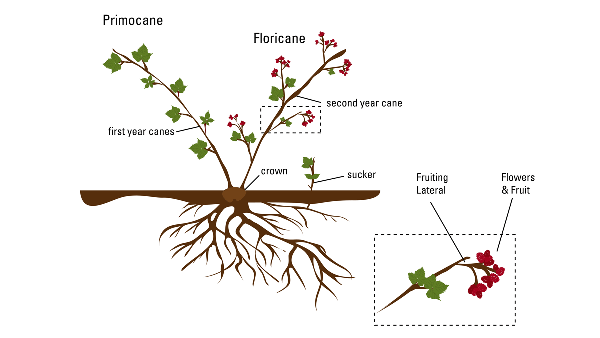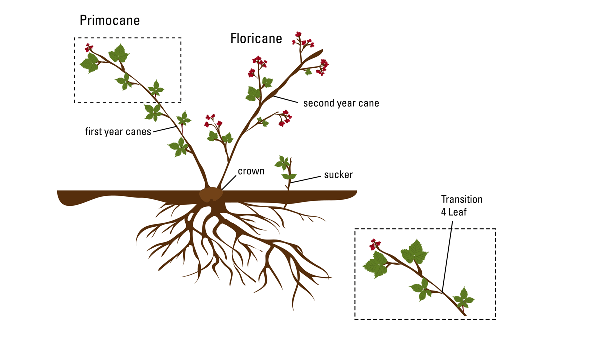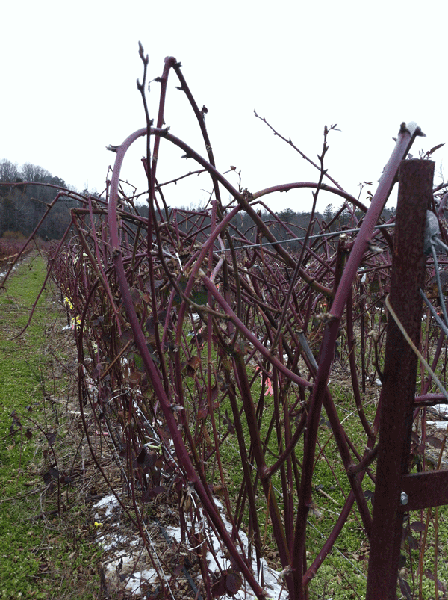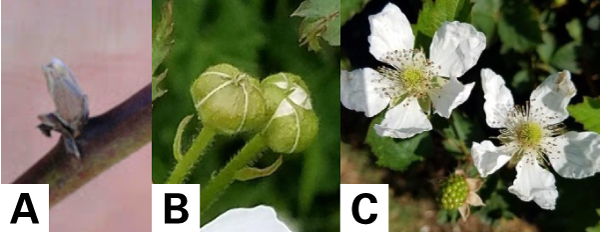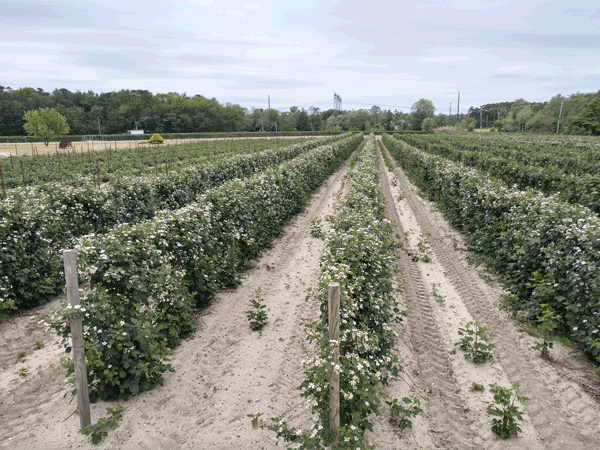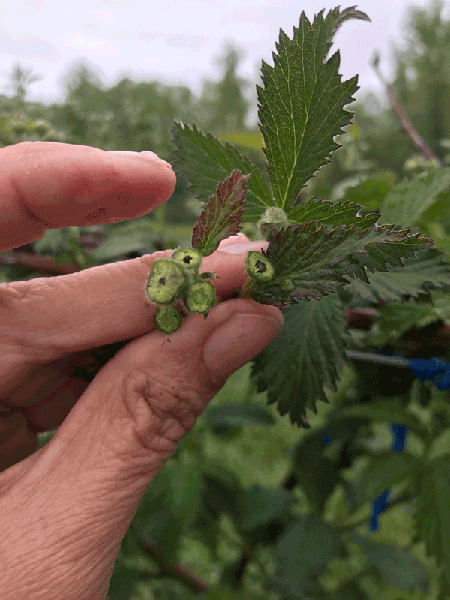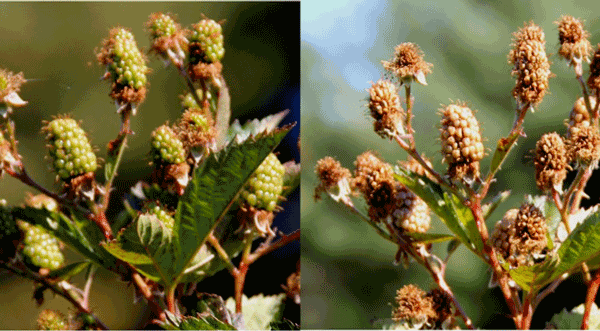General
Understanding seasonal growth cycles of blackberries and raspberries is necessary for proper training and pruning of caneberry plants. The crown of the blackberry and raspberry plants is perennial (live for many years), and the canes are biennial (two-year lifecycle). Management of canes varies by fruiting type, pruning and training practices, and the trellis system in use. Seasonal checklists are included in the Southern Region Small Fruit Consortium Small Fruits Newsletters.
Floricane-Fruiting Blackberries and Raspberries
Floricane-fruiting blackberries and raspberries have a similar plant growth cycle. In the first year, green primocanes grow vigorously, and often produce branches or lateral branches, although they remain vegetative. During the winter, these canes harden and are called floricanes in their second year. Small branches, called fruiting laterals, grow from the buds along the main cane or lateral branches (Figure 5-1). Fruit is borne on the tips of these fruiting laterals. The floricanes die after they have produced a crop. Typical pruning to remove dead floricanes takes place after harvest, in order to make space for the primocanes that have emerged from the crown.
Primocane-Fruiting Raspberries and Blackberries
Primocane-fruiting cultivars produce fruit on the tips of the first year’s cane growth in the late summer and fall and are called primocanes (Figure 5-2). Fruit production usually continues until there is a hard frost. The fruiting portion of the cane then dies. When grown only for a primocane crop, canes are mowed to the ground in the winter. If the remaining lower portion of the primocane that did not die back are allowed to grow into a second year and become floricanes (known as double cropping), the canes will fruit the next spring just below the area that fruited during the primocane year. This process of fruiting the primocane in the late summer and fall and again in the following spring after it is a floricane is known as “double cropping.” Consult with your local Extension agent about primocane-fruiting cultivars that can be grown in your region.
Lifecycle through the Seasons
Winter
-
Plants are not visibly growing during the winter months, although many blackberries will retain their leaves through the winter. The plants go through a period of cold acclimation in the fall and winter, prior to dormancy. Dormant plants (Figure 5-3) can survive the coldest parts of winter if the plant is adapted to the area and has undergone cold acclimation in the fall, which includes shortening days and cooler temperatures.
-
Cold damage can occur in the winter when temperatures drop below 0 to 10ºF. Canes can be injured at this time. Winter injury can damage vascular tissue and buds. Symptoms of winter injury include cane death, delayed or sporadic bud break, and the wilting and dying of laterals in the late spring as temperatures rise and water demand increases.
-
Plants accumulate chilling hours. Several chilling models have been developed for fruit crops. The model that is most frequently used is defined as cumulative hours of temperatures between 32°F (0°C) and 45°F (7°C). Chilling hour accumulation begins at first frost. Some models estimate that chilling is lost when temperatures rise above 60°F (16°C). Table 5-1 lists the estimated chilling hours of some common cultivars.
-
You can monitor chilling hours accumulated in North Carolina and some adjacent states by visiting the Blackberry Chill Model for North Carolina. Chilling tools for other states can be found using the Chill Hours app.
Spring
-
Plants de-acclimate quickly after winter dormancy as spring temperatures increase.
-
Low chilling cultivars can break bud early in January after adequate chilling hours have been received and a period of warm weather forces them out of dormancy. This can result in a significant crop loss if cold temperatures return and result in injury to the new shoots. Choosing cultivars well suited for your area and the average chilling hours at your location can reduce the risk of losses due to spring freeze injury.
-
Bud break occurs on floricanes. These buds are “mixed” and have both leaves and flowers. Figure 5-4 shows the stages of floral bud development.
-
Productive fields should be full of flowers in the spring (Figure 5-5).
-
Flowers are wind or bee pollinated.
-
Floral buds in all stages are susceptible to cold injury. Studies conducted in growth chambers have shown that all stages (tight bud, popcorn, and open blossom) blackberry flowers are killed at 27°F. Figures 5-6 a and 5-6b show that the center of the bud is brown and was killed. The secondary bud center is green and will continue to grow and produce flowers and fruit.
-
New primocanes emerge from the crown.
Summer
-
Fruit development for floricane-fruiting types. The number of days for fruit to develop from a full-bloom flower to some fruit varies by cultivar and region and can range from 35 to 60 days. Table 5-2 lists the flower to fruit period for several cultivars in Lincolnton, NC. Warm locations will experience more rapid fruit development than cooler locations. Growers should determine the number of days from flower to fruit for their own farm but be aware cool springtime temperatures can slow development whereas warm temperatures can speed development.
-
Primocanes continue to grow rapidly.
-
Fruit develops from green to pink to red and finally black as it ripens.
-
Flower bud development on primocanes begins for primocane-fruiting types in mid to late summer.
-
Primocane-fruiting types begin to flower in late summer/early fall and fruit matures until frost in the fall
-
Floricanes produce fruit and after fruit has ripened, the canes will begin to die back.
Fall
-
Primocanes continue to grow, but at a slower rate.
-
Bud differentiation occurs. This means that flowers can be formed during this time within the buds. This growth is not visible without dissection.
-
Carbohydrates and nutrients in canes move into the roots.
-
Primocane leaves senesce in late fall.
-
Primocane fruit on blackberries can be injured by low temperatures in late fall. Fruit damage has been observed when ambient temperatures were 22°F at night, although the damage may have occurred at a higher temperature (Figure 5-7).
Caneberry checklists through the seasons are updated each year and can be found on the Southern Region Small Fruit Consortium website under the News section.
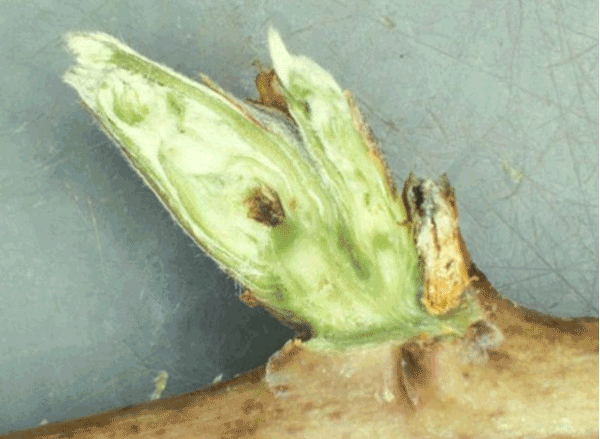
Figure 5-6a. Blackberry flower bud. The larger bud (primary bud) on the left has a brown center that was killed by temperatures below 27°F. The smaller bud at the center (secondary bud) was not injured by the cold and will produce flowers and fruit. The brown nub on the right is a remnant of the leaf from the previous summer.
Source: Gina Fernandez.
Publication date: Feb. 23, 2023
AG-697
Other Publications in Southeast Regional Caneberry Production Guide
- Introduction
- Cultivars
- Site Selection
- Site Preparation, Planting, and Establishment
- Plant Growth
- Pruning and Training
- Trellis Systems
- Tunnel Production
- Water Management
- Integrated Pest Management and Pollination
- Fertility Management
- Fruit Development
- Harvesting and Postharvest Management
- Food Safety Considerations for Caneberry Production
N.C. Cooperative Extension prohibits discrimination and harassment regardless of age, color, disability, family and marital status, gender identity, national origin, political beliefs, race, religion, sex (including pregnancy), sexual orientation and veteran status.

